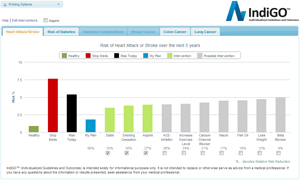Healthcare Modeling Part 4: How the Archimedes Model Works and is Validated
David Eddy, M.D., Ph.D., is a long-standing pioneer in the theory and application of evidence-based medicine and mathematical modeling in healthcare. Dr. Eddy is co-creator of the Archimedes Model –a clinically realistic, trial-validated mathematical model of human physiology, diseases, interventions, and healthcare systems.
At the Model’s core are hundreds of ordinary and differential equations that represent human physiology and the effects of diseases. The Model also includes detailed aspects of healthcare systems to analyze downstream clinical events, utilization, and costs.
The Model is used to predict the long-term health and economic effect of changes in the healthcare system, such as new treatments, tests, and changes in the associated medical guidelines, processes and practice patterns. It is also used by clinical and administrative decision makers as a clinical management tool for forecasting, guideline design, cost and comparative-effectiveness analysis, and priority setting.
In this webinar Dr Eddy will explain:
- How the Model is formulated
- How physiology is modeled
- How patient behavior is modeled
- Sources and methods for deriving equations
- How utilization and costs are calculated
- How the Model is validated
Speaker

David M. Eddy, MD, PhD, Founder and Chief Medical Officer Emeritus, Archimedes
David Eddy, MD, PhD, is the Founder and Chief Medical Officer Emeritus of Archimedes Inc. He started his career as a Professor of Engineering and Medicine at Stanford, and the J. Alexander McMahon Professor of Health Policy and Management at Duke University. David received his MD from the University of Virginia and his PhD in Engineering-Economic Systems (Applied Mathematics) from Stanford.
More than 25 years ago, David wrote seminal papers on mathematical modeling, guidelines, and evidence in medical decision making. He was the first to use and publish the term evidence-based and has pioneered the theory and applications of evidence-based guidelines.
David is the author of five books, more than 100 first-authored articles, and a series of 30 essays for the Journal of the American Medical Association. His writings span from technical mathematical theories to broad health policy topics. David has received top national and international awards in ten fields including operations research and management sciences, health technology assessment, environmental sciences, healthcare quality, outcomes research, pharmacoeconomics research, and managed care pharmacy.
He has been elected or appointed to more than forty national and international boards and commissions — including Consumers Union, the National Board of Mathematics, the World Health Organization Panel of Experts, The Blue Cross Blue Shield Medical Advisory Panel, and the National Committee for Quality Assurance. He is a member of the Institute of Medicine/National Academy of Sciences
Who Should Attend?
Life Sciences organizations. In particular individuals in:
- Medical Affairs and Clinical Operations/Research
- Health Economics and Outcomes Research
- Marketing
Policy, research, and voluntary health organizations. In particular:
- Chief Medical Officers, Chief Financial Officers, Modeling Directors, VP’s of Quality, and Heads of Science and/or Research
Healthplans, Integrated Delivery Networks, and anyone interested in understanding how mathematical modeling can change healthcare
Xtalks Partner
Archimedes
Archimedes is a Healthcare Modeling company that has built a large scale simulation model of physiology, disease, interventions, and healthcare systems.
The Model is written at a high level of detail using object-oriented programming and run on a distributed computing network. The core of the Model is a set of ordinary and differential equations that represent the physiological pathways pertinent to diseases and their complications. The Model includes aspects of diseases and healthcare systems needed to analyze downstream clinical events, utilization, and costs including: signs and symptoms; patient behaviors in seeking care; patient encounters with the health care system (e.g. emergency room visits, office visits, and admissions); protocols and guidelines; tests and treatments; provider behaviors and performance; patient adherence to treatment recommendations; and clinical events that affect logistics, utilization, and financial costs. The Model is flexible, validated against more than 50 clinical trials, and helps decision makers understand the likely outcomes of interventions.
To learn more about the Archimedes Model visit www.archimedesmodel.com/modeling
You Must Login To Register for this Free Webinar
Already have an account? LOGIN HERE. If you don’t have an account you need to create a free account.
Create Account


